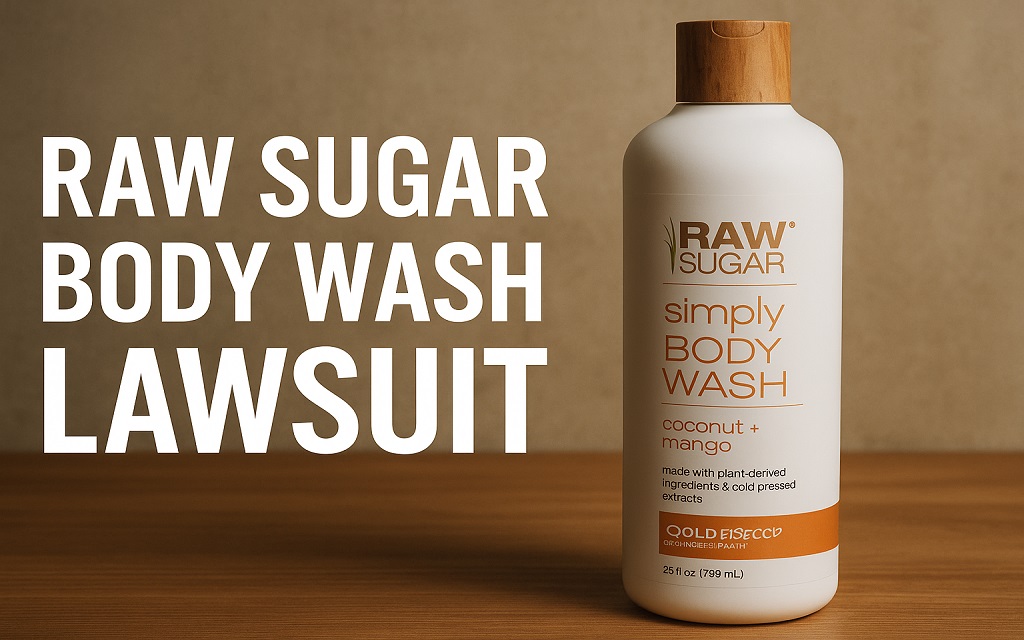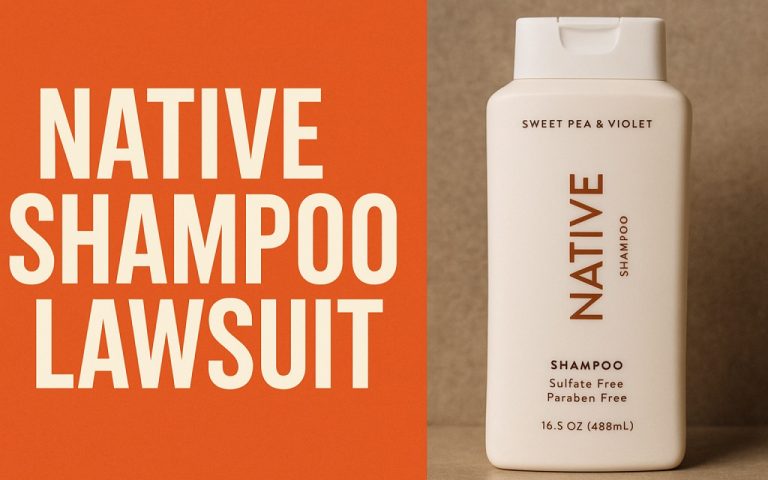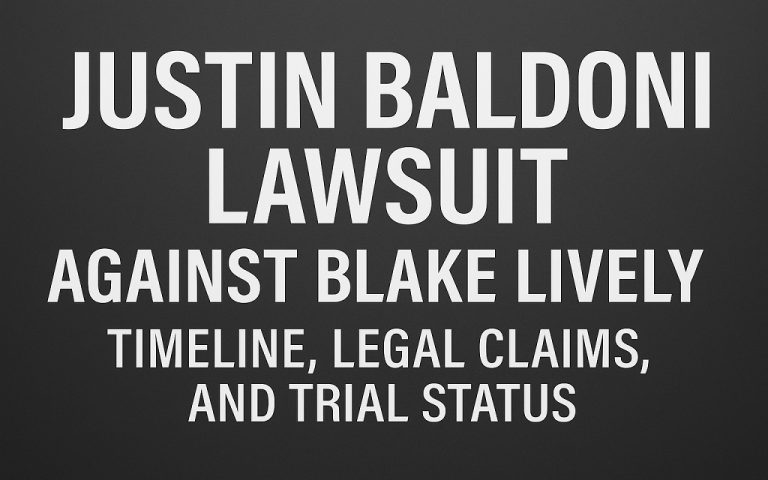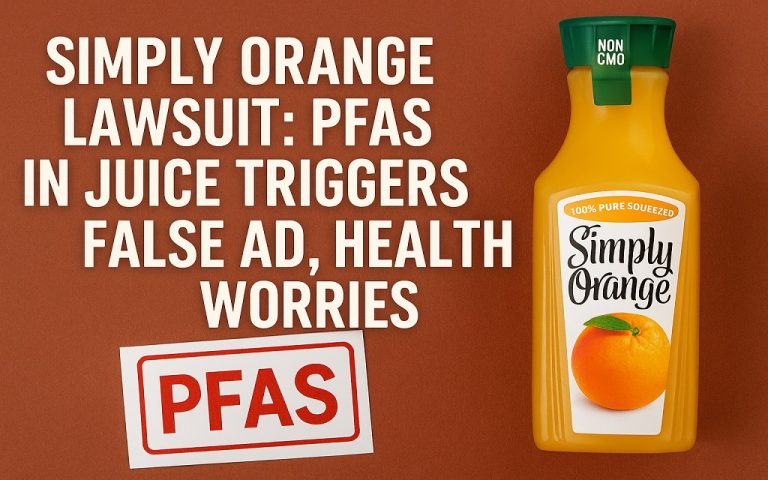One of the most talked-about consumer lawsuits of 2025 is the Raw Sugar Body Wash lawsuit. It calls into doubt the sincerity of skincare promotion. Many buyers now doubt the brand’s long-standing claims of being natural, pure, and safe.
Citing false “plant-based” claims, the use of synthetic substances, and misleading marketing that deceived consumers, the complaint alleges that Raw Sugar’s deceptive labeling violated U.S. consumer protection laws.
This case serves as a warning to customers rather than just one complaint. By understanding the Raw Sugar Body Wash lawsuit, you can better understand how the FDA and FTC enforce truth-in-advertising regulations, safeguard yourself against deceptive claims, and make informed purchase decisions.
Is Raw Sugar Body Wash Really Natural?
You have probably seen Raw Sugar products in major retail stores. The firm markets the body wash as safe, natural, and pure. Many consumers now doubt that image. The Raw Sugar Body Wash Lawsuit started when consumers claimed the company had misled them about the actual contents of the container.
It is crucial to understand that deceptive advertising is at the heart of the complaint. Plaintiffs claim that Raw Sugar Living used marketing terms such as “chemical-free,” “clean,” and “made from plants.” Tests and ingredient reviews revealed the use of synthetic preservatives and artificial fragrance agents.
Consumer rights groups quickly reacted. According to reports, the personal care industry in the United States exceeded USD 20 billion in 2024. More than half of consumers spend more on natural items. Clean beauty marketing is built on that trust. Brands risk legal action and negative publicity when they fabricate information.
Additionally, you should be aware that the complaint references both state and federal consumer protection statutes. The Federal Trade Commission Act (FTC Act) and associated state misleading advertising laws, according to the plaintiffs, were broken by Raw Sugar.
Raw Sugar Body Wash Lawsuit Timeline
Key Legal Events and Case Updates
No class settlement finalized. Case stays active in California federal court. Parties continue discovery and negotiations. Raw Sugar Body Wash Lawsuit Timeline 2025 still open.
New 2025 coverage described the Raw Sugar Body Wash Lawsuit as a leading false-labeling case in personal care.
Consumer-law sites reported early settlement discussions over false “natural” advertising, similar to other clean-beauty suits.
Plaintiffs moved to compel full ingredient and supplier data after partial production. Court ordered supplemental discovery.
Court allowed core California consumer claims to proceed. Discovery opened on labeling, testing, and marketing channels. Raw Sugar Body Wash Lawsuit Timeline 2025 remains active.
Plaintiffs filed opposition. They attached ingredient evidence to show synthetic preservatives in body wash. Judicial Ocean+1
Defense filed motion to dismiss and to strike statewide class allegations. Motion challenged plausibility of “all natural” theory.
Raw Sugar Living appeared through counsel. Defense requested short extension to answer or move.
Case assigned to a federal district judge. Court set initial disclosure and response deadlines. Raw Sugar Body Wash Lawsuit Timeline 2025 continues.
Plaintiffs filed the Raw Sugar Body Wash Lawsuit in California federal court for misleading “natural” body wash labels. Judicial Nexus
Counsel sent demand letters to Raw Sugar Living. Letters alleged false advertising under California UCL, CLRA, and FAL.
Consumer groups reviewed Raw Sugar “natural” and “plant-based” claims. Potential mislabeling flagged. Start of Raw Sugar Body Wash Lawsuit Timeline 2025.
Why Do Customers Think Raw Sugar Misled Them?
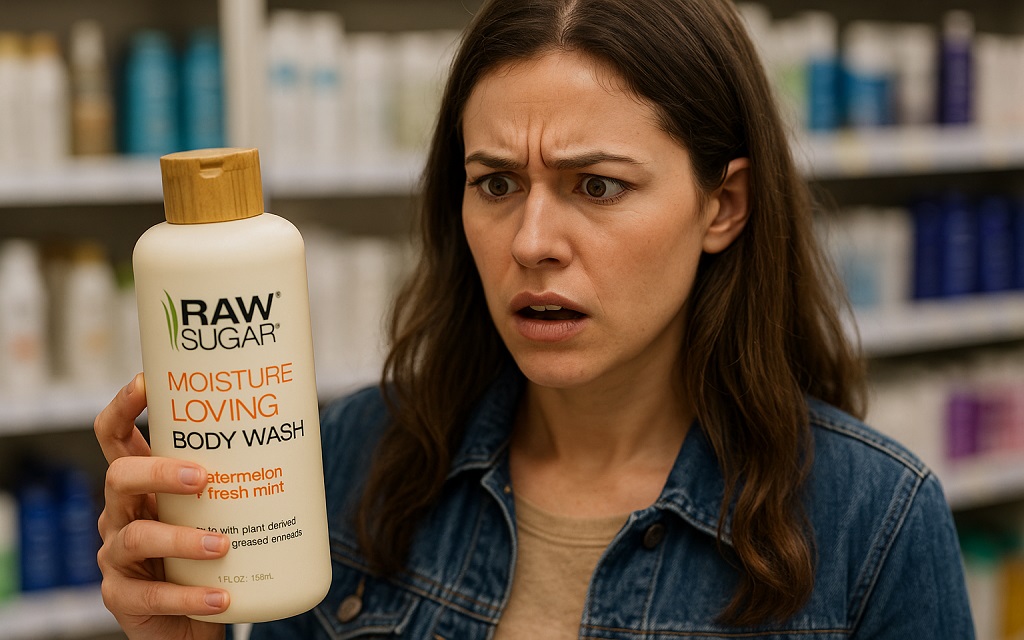
Customers contend that the purported purity of Raw Sugar does not correspond with the actual contents of the container. Analysis revealed the presence of substances used in industrial manufacturing, despite the label’s claim of organic components. Several products contain synthetic stabilizers and surfactants.
It is essential to understand why this creates a legal issue. Federal guidelines permit “natural” marketing only when ingredients meet strict purity definitions. Many plaintiffs allege that Raw Sugar’s marketing violated Section 5 of the FTC Act, which prohibits deceptive acts in commerce.
A 2023 Nielsen report found that 59 percent of U.S. adults associate “plant-based” with “chemical-free.” That perception influences spending habits. When companies rely on those words without proof, consumers lose money and trust.
You should know that Raw Sugar is not alone. Other brands such as Aveeno and TRESemmé faced similar lawsuits. Each case centered on hidden synthetic compounds under a natural label. The pattern strengthens the credibility of consumer claims against Raw Sugar Living.
What Does False or Misleading Advertising Mean to the FTC?
Laws against misleading marketing are enforced by the Federal Trade Commission (FTC). Any representation that deceives reasonable people is considered deceptive advertising, according to the agency. Companies must base all claims on evidence—labels like “natural,” “organic,” and “sustainable” fall under this category.
It is crucial to understand that the FTC has the authority to penalize businesses for inadvertent deceit. A brand must prove its statements are truthful. Regulators may step in if a label suggests a benefit that isn’t supported by science.
According to FTC data, there was a 27% increase in personal-care advertising violations between 2020 and 2024. Most cases involve “free-from” claims that lack clear proof. Raw Sugar faces scrutiny under that same category.
Regulations are relied upon by consumers. Truth-in-labeling is a shared obligation of the Food and Drug Administration (FDA) and the FTC. The FDA governs cosmetic ingredient disclosure. The FTC keeps an eye on the veracity of advertisements. Coordination between both agencies often determines class-action outcomes.
You should remember that false advertising does not always involve safety risks. The key issue lies in economic harm. Buyers pay more due to misleading labels.
What Ingredients in Raw Sugar Body Wash Sparked the Lawsuit?
Court filings identify multiple ingredients that contradict Raw Sugar’s “natural” branding. These include phenoxyethanol, PEG-40 hydrogenated castor oil, sodium benzoate, and blends of synthetic scents. Every material has a chemical function, yet none are “chemical-free.”
Understanding the scientific context is crucial. By inhibiting the development of microorganisms, sodium benzoate increases shelf life. PEG compounds improve texture and foaming. Phenoxyethanol stabilizes formulas. The problem does not stem from toxicity but from marketing inconsistency.
Laboratory tests cited in consumer petitions show that Raw Sugar’s formula contains up to 15 percent synthetic agents. That data undermines slogans like “made from plants.”
You should always review ingredient labels before purchase. According to experts at the Environmental Working Group, at least one petroleum-derived component is included in 45% of “natural” body cleansers. Transparency is crucial so consumers can make informed decisions.
What Was Raw Sugar Living’s Reaction to the Claims?
Raw Sugar Living denied wrongdoing. Company executives claim that product labels comply with both legal requirements and industry norms. The company highlights its dedication to cruelty-free sourcing and sustainability.
Notably, Raw Sugar emphasized certifications like RSPO Sustainable Palm Oil and Leaping Bunny. The goal of those credentials is to increase customer trust. However, plaintiffs contend that ethical sources do not justify false composition assertions.
Additionally, you should be aware that public relations remarks do not replace legal defenses. A court must evaluate evidence showing whether average consumers were misled. Similar brands have settled comparable suits through refunds or label adjustments.
Legal defense expenses for national labeling lawsuits can surpass $5 million USD per brand, according to industry observers. The language used in marketing and the scientific evidence frequently determine the result.
What Laws Protect Consumers Against Misleading Product Labels?
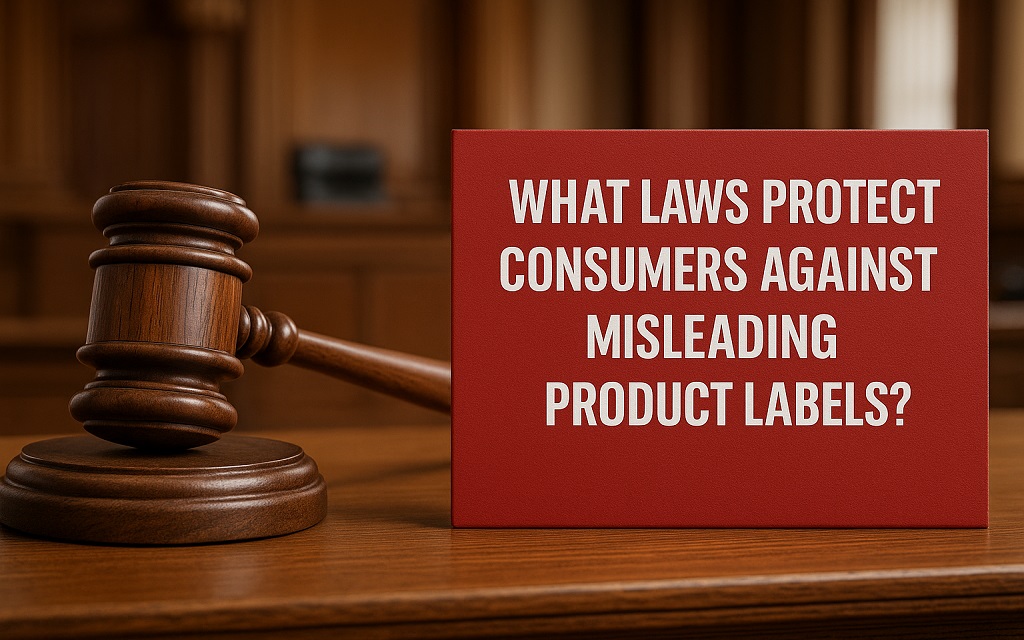
The Food, Drug, and Cosmetic Act, the Federal Trade Commission Act, and many state consumer protection statutes all apply to truthful marketing. Businesses that misrepresent the quality or ingredients of their products risk federal fines and penalties.
States like Illinois, New York, and California are adding stronger protections. In California, the False Advertising Law (FAL) and the Consumers Legal Remedies Act (CLRA) allow class actions for false or misleading labels, with remedies that include restitution and attorney’s fees.
68% of consumers read skincare labels before making a purchase, according to a 2024 Consumer Reports poll, demonstrating growing public knowledge of accurate labeling.
The FDA requires that ingredient listings be correct in accordance with the Fair Packaging and Labeling Act. Recalls or warning letters may result from inaccurate or insufficient labeling. The FDA and FTC collaborate to ensure that skincare marketing is truthful, transparent, and compliant nationwide.
Can Customers Take Part in or File a Class Action Lawsuit Against Raw Sugar?
If you bought Raw Sugar Body Wash believing it was natural, you may be entitled to participate in a class action. Gathering evidence of purchase, such as product images, online order confirmations, or receipts, is crucial.
Class action lawsuits group individuals with similar claims. Courts appoint lead plaintiffs to represent all affected parties. Settlement funds often provide small refunds per purchase.
It is essential to know that class membership usually requires meeting deadlines. Law firms announce claim forms on verified websites once cases advance. For updates, keep an eye on legal bulletins or speak with consumer law attorneys.
The U.S. Courts Administrative Office reports that consumer class lawsuits rose by 19% in 2024. Most of them concern misleading advertising in the health and beauty sectors. The Raw Sugar case aligns with that trend.
How Do Misleading Labels Impact Consumer Rights?
Deceptive marketing harms more than wallets. It lowers trust in the clean-beauty industry. Customers should be given accurate information regarding the substances that come into contact with their skin.
It is crucial to understand that even in cases when there is no bodily impairment, economic injury is recognized by the law. Paying premium prices for goods that are falsely labeled qualifies as damage under the FTC Act and state laws.
Keep in mind that customers have received partial refunds as a consequence of settlements in comparable circumstances. Members of the TRESemmé Keratin Smooth class, for instance, received up to $10 per product in 2023.
According to regulatory experts, total consumer compensation in the personal care industry surpassed 80 million USD in 2024. These results show how legal pressure encourages openness.
Have Other Skincare or Cosmetic Brands Faced Similar Lawsuits?
Yes. The Raw Sugar Body Wash Lawsuit reflects a broader industry pattern. The Raw Sugar case is not unique. Several major beauty brands faced scrutiny for “natural” and “chemical-free” claims. In 2022, Burt’s Bees settled the charges after admitting to using artificial preservatives. Neutrogena recalled benzene-containing aerosol products in 2021.
It is essential to recognize that courts often regard misleading language as sufficient to establish liability. Physical injury is not necessary.
Since 2020, advertising phrases like “clean” and “eco-friendly” have been utilized in 42% of cosmetic cases, according to legal data from the University of California Hastings College of Law. These patterns suggest a long-term shift toward stricter regulations. That statistic reveals how enforcement evolves with consumer priorities.
You should note that many cases end in confidential settlements. Brands prefer to avoid reputational damage. That approach prevents public disclosure but rarely clears suspicion.
How Do Global Laws Compare on Product Label Transparency?

Other countries apply similar standards. The European Union Cosmetics Regulation (EC No 1223/2009) forbids the use of deceptive images and requires accurate ingredient labeling. The United Kingdom’s Competition and Markets Authority (CMA) monitors “greenwashing” as part of its consumer protection framework.
Understanding that international entities coordinate cross-border commodities investigations is crucial. A brand that sells online must meet each region’s requirements.
You should be aware that U.S. enforcement is influenced by global awareness. American politicians frequently adopt stricter regulations when the EU does. To address cross-jurisdictional challenges, Raw Sugar and its associated companies are urged to maintain uniform labeling.
According to a 2024 OECD assessment, false environmental claims cost consumers $2.5 billion worldwide each year. That figure illustrates how serious the problem is.
What Should You Do If You Buy Raw Sugar Body Wash?
You can protect your rights in several ways. Take the obvious steps listed below:
- Keep all purchase receipts or online confirmations
- Save photos of the product and its label
- Track case updates through verified consumer law websites
- For individualized advice, speak with a knowledgeable lawyer.
- Use the FTC complaint portal to report misleading advertising.
It is essential to stay informed. Class actions often proceed slowly. Updates appear through public filings or law firm announcements. You should avoid unofficial claim websites that request sensitive data.
Consumer advocates recommend filing complaints even if refunds appear small. Large participation rates strengthen settlement negotiations.
How Could the Raw Sugar Lawsuit Affect the Beauty Industry?
Industry analysts predict long-term effects on marketing standards. Every lawsuit forces businesses to review their ingredient lists and advertising.
It is critical to understand that the FTC Green Guides’ 2026 edition may tighten the language regarding “eco-friendly” promises. For every environmental declaration, companies may need third-party verification.
The Raw Sugar dispute signals a growing shift toward accountability. According to a Statista market research survey, 72% of American buyers increasingly check product claims before making a purchase. Stricter audits and greater industry openness are to be expected.
Brands are often forced to change packaging or reformulate products to avoid financial penalties. That outcome benefits consumers who demand honesty and safety.
Why Transparency in Labeling Matters for You
Confidence is increased by transparency. You have to be knowledgeable about the skin care items you use. Honest labeling allows you to assess value, safety, and sustainability.
It’s crucial to remember that ingredient awareness goes beyond makeup. Many personal-care products face identical marketing challenges. When one lawsuit exposes deception, others follow.
You should form behaviors that safeguard both your health and finances. Always read ingredient lists, research brand reputations, and use government recall databases.
A 2025 Pew Research survey found that 61% of Americans would switch brands if discovering deceptive advertising. Consumer behavior directly shapes corporate ethics.
What Is the Future of “Natural” Product Lawsuits?
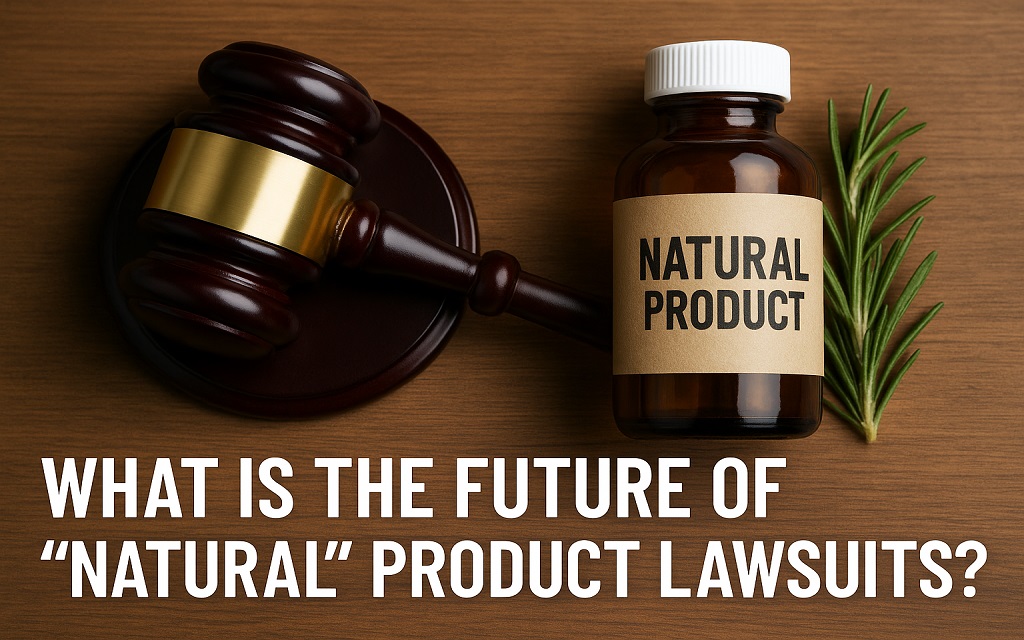
Legal experts forecast that the number of clean-beauty litigation cases will increase through 2026 and 2027. Growing consciousness is fueling calls for more stringent definitions of “natural” and “organic.”
Notably, under the Modernization of Cosmetics Regulation Act (MoCRA), authorities are creating new labeling regulations. Influencer marketing and internet advertising may be covered by enforcement.
Higher sustainability requirements and evidence of ingredient provenance should be anticipated. Organizations risk being sued if they cannot substantiate their marketing promises.
By 2027, industry analysts predict that false-label litigation damages could reach $250 million USD worldwide. The Raw Sugar lawsuit is part of the broader consumer justice movement.
FAQs
Is Raw Sugar Body Wash safe?
It is generally safe for many users, but it contains some synthetic ingredients and allergen concerns, which may not align with “100% natural” expectations.
Is Raw Sugar actually a clean brand?
The brand markets itself as better-for-you—with vegan, cruelty-free, and paraben- and sulfate-free claims—but experts suggest its “clean” label may not fully align with ingredient transparency.
Is Raw Sugar shampoo safe?
It appears to be formulated to safer standards and with fewer harsh chemicals, but, as with any personal-care product, individual skin sensitivity means safety cannot be guaranteed universally.
What company owns Raw Sugar Body Wash?
The brand is owned by Raw Sugar Living, which received investment from WM Partners.
Conclusion
The Raw Sugar Body Wash lawsuit reveals more than corporate marketing flaws. It reflects how public awareness reshapes industry ethics. You now understand how U.S. law defines honesty in advertising and how to act when companies fail that standard.
It is essential to remain alert to future updates. Consumer vigilance drives transparency. Each report or claim adds momentum toward safer, more truthful products for everyone.
Disclaimer: The content above provides general information only. It does not replace legal advice. You should consult a licensed attorney for assistance with any specific consumer or product-labeling issue.
Musarat Bano is a content writer for JudicialOcean.com who covers lawsuits, legal news, and general legal topics. Her work focuses on research-based, informational content developed from publicly available sources and is intended to support public awareness. She does not provide legal advice or professional legal services.

